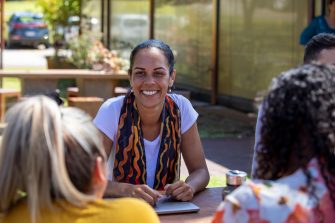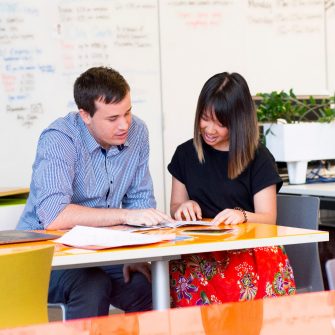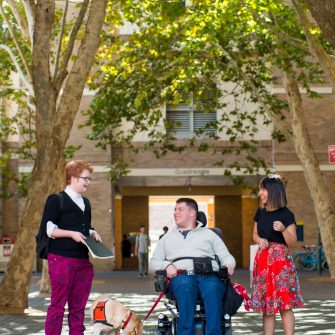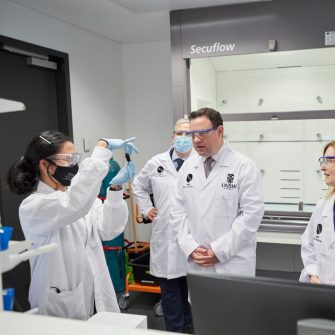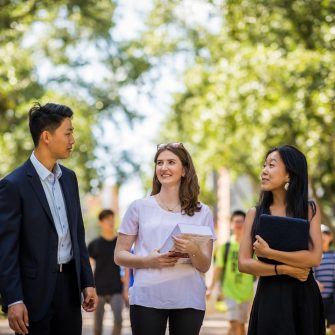Enhanced, equitable community health & wellbeing
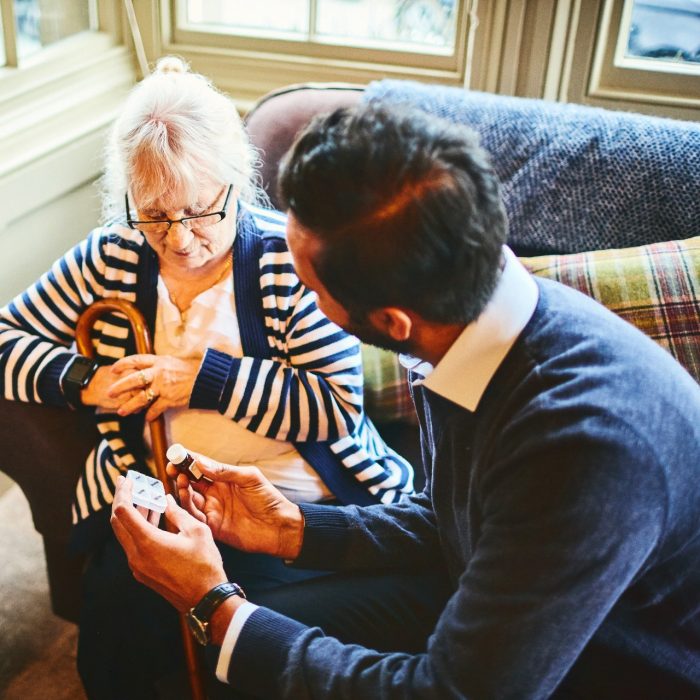
Director of Primary Health Care and Equity Research
The Director, Primary Health Care and Equity has a leadership role in primary health care and health services translational research in the Faculty of Medicine. This role includes the development and implementation of improved models of primary health care to create better, fairer health and health care in the community. The position works in close collaboration with NSW Health services, primary health networks and community and consumer organisations.
The position leads the Centre for Primary Health Care and Equity, and contributes to the leadership in the School of Population Health, the Centre for Future Health Services and the Faculty of Medicine and Health. The role also includes post graduate supervision and teaching in the postgraduate programs in the School of Population Health.
The role reports to the Head, School of Population Health and has 5 direct reports.
Message from the Head of School
At UNSW School of Population Health, we believe everyone has the right to good health. We are on a mission to address health equity no matter where a person lives.
As the oldest and largest health management program in Australia and ranked in the top 50 globally for public health research, our School is a pioneer in population health, global health, health leadership and management. Our work ranges from responding to emerging public health crises to training the future health workforce.
CPHCE is a Centre of our School and contributes to teaching in postgraduate courses and research student supervision.
By joining CPHCE you’ll join a considerable institution of learners, thinkers, researchers and innovators, with more than 1000 undergraduate and postgraduate coursework students and 200 research candidates enrolled in our School.
At UNSW Population Health, we are a friendly and diverse bunch working hard to achieve social justice and better health for all. I welcome you to explore CPHCE's remarkable achievements and consider joining us.
Professor Rebecca Ivers
- About the Centre for Primary Health Care
- About you
- Position description
- Terms
- How to apply
The Centre for Primary Health Care and Equity is a research centre of the UNSW within the School of Population Health, Faculty of Medicine and Health. It is managed by a team of Directors and led by an Executive Director. A university steering committee provides oversight and review of the Centre’s performance. A Centre Advisory Group provides advice on key issues in the sector and future direction for the research program. The Centre co-manages and jointly funds research, training and development collaborations in Local Health Districts.
The way in which the Centre operates strongly reflects primary health care principles and values, particularly those associated with partnership, empowerment, equity, social determinants and inter sectoral actions. These principles are combined with a commitment to maintaining high quality academic standards and rigour. We work with policy makers practitioners and communities to find new ways of providing primary health care that will improve the health and wellbeing of especially marginalised Australians.
Our work makes a difference. These are some of our achievements in 2022:
CPHCE was successful in securing four more years of infrastructure funding from the NSW Ministry of Health under the Prevention Research Support Program – a total $1,200,000 over the 4 years. The new funding commenced in 2022 and will continue until 2026.
Twelve bilingual Community Health Navigators in the general practice pilot program completed training. This project informed the successful NHMRC funded Community Health Navigators Extending Care in the Community Study which began recruitment in 2022.
Findings from the Health e-Literacy for Prevention in General Practice (HeLP-GP) study informed the development of the RACGP Health Habits App which is currently being implemented throughout general practice to support changes to diet and physical activity.
We accepted an award for the project - Improving the quality of long-term cancer survivorship care for colorectal and breast cancers. This project was funded through the Avant Foundation & Other Grant scheme in 2020. This work was expanded to mental health shared care in SESLHD, funded by a Translational Research Grant.
Shisha No Thanks’ Team won this year’s UNSW Faculty of Medicine & Health Research Community Engagement Team Award 2022 Team included members from from CPHCE
The successful candidate will be a recognised research leader in primary health care and equity with an outstanding research and translation track record. This will be demonstrated through a competitive grant track record, peer-reviewed publications, reports and research impacts on health policies and programs. With previous experience in health services, the successful candidate will have existing relationships and be capable of developing new relationships with health and welfare departments, health services, primary health networks, clinical associations, and community and consumer organisations.
-
The Director of Primary Health Care and Equity Research has a leadership role in primary health care and health services translational research in the Faculty of Medicine. The individual in this role will play a leadership role in the development and implementation of improved models of primary care, particularly for populations that are under-served. The Centre works in close collaboration with NSW Health services, primary health networks and community and consumer organisations. It attracts funding from a range of sources, including UNSW and NSW Health (both centrally and through its Local Health Districts) and a variety of research grants.
The position contributes to the leadership within the Centre, as well as in the School of Population Health and UNSW Medicine & Health. The role also involves post graduate supervision and teaching in the postgraduate programs in the School of Population Health.
The role reports to Head, School of Population Health and has 5 direct reports.
-
Level D
- Health professional qualification and eligibility for registration in Australia
- PhD degree or equivalent doctoral qualification.
- Recognised research leader in primary health care and equity with outstanding track record in peer-reviewed publications and demonstrable grant success in competitive grants.
- Experience and expertise translating research into health practice and policy.
- Professional experience in health services and experience developing relationships with health services.
- Demonstrated ability to lead research teams and work collaboratively with other researchers and health service providers.
- Evidence of highly developed interpersonal and collaboration skills with demonstrated ability to work and influence across disciplines, Faculties, institutions, industry and professional accreditation bodies.
- Demonstrated capacity to provide leadership, management and mentoring to staff and colleagues in teaching and research.
- Ability and capacity to implement required UNSW health and safety policies and procedures.
- An understanding of and commitment to UNSW’s aims, objectives and values inaction, together with relevant policies and guidelines.
Level E (in addition to the above)
- Demonstrated capacity to lead by example in supporting equal opportunity and equity, diversity and inclusion policy and programs as they relate to staff and students,
- Proven leadership in developing significant productive relationships and engagement with industry and the community, with success in attracting significant industry funding.
-
Level D
Specific accountabilities for this role include:
- Review and update the strategic direction for the Centre, and its areas of focus and relationships to other parts of UNSW and the Health System
- Identify and prioritise critical resources required for the centre, and recruit, develop and retain academic staff that excel in research to achieve the centre’s objectives.
- Participate in and contribute to the UNSW Centre for Future Health Systems as a member of the leadership team
- Increase the quality and calibre of research and stakeholder engagement activities undertaken by the Centre.
- Foster and ensure a supportive and collaborative culture among primary care researchers and staff within the Centre, and across the Faculty of Medicine and Health.
- Teach in postgraduate programs of the School of Population health, co-convening one of the subjects which CPHCE has responsibility for.
- Supervise and support higher degree research students in the Centre.
- Mentor academic students in their development of successful research careers, including mentoring and support for primary health care clinicians.
- Participate in teaching and research development and governance activities at the Centre, School, Faculty and University levels, as well as play an active role in the School/Faculty activities and committees.
- Maintain relationships with stakeholders within and outside of UNSW (eg Commonwealth and State Governments, collaborating Universities, International Organisations).
- Align with and actively demonstrate the UNSW Values in Action: Our Behaviours and the UNSW Code of Conduct.
- Cooperate with all health and safety policies and procedures of the university and take all reasonable care to ensure that your actions or omissions do not impact on the health and safety of yourself or others.
Level E (in addition to the above)
- Be an outstanding research leader in primary health care research with a focus on equity and attract competitive research funding that is consistent with the broad research aims of the Centre and School and that aligns with the strategic research directions of UNSW Medicine and Health.
- Develop research, build capacity and maintain relationships with Local Health Districts, NSW Health agencies and Primary Health Networks through its Hubs and collaborative programs.
- Lead the CPHCE and implement appropriate governance structures for the Centre.
-
This position will be offered at a Level D or E dependent on the successful candidate’s skills, qualifications and experience.
All of our employees (excluding casuals) are entitled to receive 17% employer superannuation contributions. New employees are entitled to select their preferred superannuation fund or UniSuper, the industry fund for the Tertiary Education sector.
Our salary-sacrificing initiatives allow you to pay some or all of the offering before tax.
We also offer the option to salary package a fully maintained vehicle under a lease known as a novated lease. Car parking is available on campus with the ability to pay via fortnightly payroll salary sacrifice deductions.
-
Your employment is conditional upon the completion of all required pre-employment or background checks. In addition, your ongoing employment is based upon the satisfactory maintenance of all relevant clearances and background check requirements.
UNSW requires that all employees have eligible working rights within Australia. As one of Australia’s top employers, we understand that some candidates may benefit from support to relocate and join our university.
If you are offered a position at the university and are not an Australian citizen or permanent resident, the university may be able to assist with sponsorship arrangements. This includes obtaining the appropriate visa to allow you to work at UNSW.
The type of visa arrangement would depend on the length of your appointment at UNSW. Our external providers, Visa Lawyers Australia, will initially make that assessment of your application on behalf of UNSW and the UNSW Recruitment team will also guide you through this process.
We may also offer financial assistance to successful candidates who are required to move from their current residence in order to take an appointment at UNSW.
-
Your employment is conditional upon the completion of all required pre-employment or background checks. In addition, your ongoing employment is based upon the satisfactory maintenance of all relevant clearances and background check requirements.
UNSW requires that all employees have eligible working rights within Australia. As one of Australia’s top employers, we understand that some candidates may benefit from support to relocate and join our university.
If you are offered a position at the university and are not an Australian citizen or permanent resident, the university may be able to assist with sponsorship arrangements. This includes obtaining the appropriate visa to allow you to work at UNSW.
The type of visa arrangement would depend on the length of your appointment at UNSW. Our external providers, Visa Lawyers Australia, will initially make that assessment of your application on behalf of UNSW and the UNSW Recruitment team will also guide you through this process.
We may also offer financial assistance to successful candidates who are required to move from their current residence in order to take an appointment at UNSW.
-
As places of great inspiration and innovation, Australian universities are crucial intellectual environments where knowledge is created, communicated and challenged. In partnership with government and business, academic research and technologies help to develop vital industries. In addition, Australian universities provide students with the skills to compete in increasingly global workplaces and are ourselves major employers.
Universities are key to Australia’s economic success. In 2018, Australian universities contributed $41 billion to the economy and supported a total of 259,100 full-time jobs. In addition, 1,426,594 students studied at Australia’s 39 universities in 2018. Of these, 71 per cent (or 1,014,027) were domestic students and the remaining 29 per cent (or 412,567) were international students. In the same year, 325,171 students completed their degrees.[1]
When it comes to world university rankings, Australia has a strong, proven track record. Across all global ranking systems, criteria and fields of study, Australia ranks highly for quality of education, student satisfaction and global reputation. The latest ranking shows more than eight Australian universities are ranked in the top 200 universities and almost two-thirds of Australia’s 39 universities are in the top 500.[2] In addition, Australia consistently ranks highly in the Universitas 21 Report – in 2020, it ranked ninth.[3]
Australian university students pursue a wide range of academic disciplines, from health and education to engineering and information technology. While the majority of students study full-time, others balance a part-time load with family or work responsibilities and, in the current environment, many combine on-campus and online study for maximum flexibility.
International education is Australia’s fourth-largest export and the largest services export industry. In 2019, the industry generated $40.3 billion in export income. The higher education sector contributed around 70 per cent (or $27.8 billion) of international education export income in 2019.[4]
The 2018 Excellence in Research for Australia (ERA) national report, which provides information of the quality of research undertaken by Australian universities, assessed that more than 90 per cent of Australian university research was performing at, or above world standards in 2018.[5]
UNSW is a founding member of the Group of Eight (Go8), a coalition of Australia’s leading research-intensive universities, and the prestigious Universitas 21 international network. In world rankings Go8 universities are consistently the highest ranked in Australia. Seven of the Go8’s members are in the world’s top 100 universities and all Go8 members are ranked in the world’s top 150 universities: in the Academic Ranking of World Universities (ARWU) from Shanghai Jiao Tong University, the Times Higher Education Rankings (THES) and the QS World University Rankings (QS).[6]
[1] 2020, Universities Australia 2020 Higher Education Facts and Figures
[2] 2020, Universities Australia 2020 Higher Education Facts and Figures
[3] 2020, Universities Australia 2020 Higher Education Facts and Figures
[4] 2020, Universities Australia 2020 Higher Education Facts and Figures
[5] 2018 Excellence in Research for Australia (ERA) 2018 report, produced by the Australian Research Council (ARC
[6] Group of Eight, Australia -
Sydney was recently ranked the sixth best city in the world to live and work in by Global Finance magazine. With world-famous beaches and a thriving arts, music and food scene full of cultural communities to immerse yourself in, our coastal city is not just a destination, but a life experience.
Coastal living
It’s easy to see why the sunshine and coastline of Sydney’s Eastern Suburbs beaches attract so many visitors, and UNSW’s Kensington campus sits right next door. It’s less than 30 minutes from campus to Bondi by car or bus, or just 10 minutes to Coogee.
If the beach isn’t your thing, we’re five minutes from beautiful Centennial Park or a short stroll to Randwick’s buzzing shops, cafés and restaurants.
Expand your network
Sydney’s the financial capital of Australia, and our international city is home to many global firms, offering countless opportunities to gain experience, meet people and build your networks.
A city for students
Sydney was ranked as the eighth best student city in the world in the QS Best Student Cities Index 2022. Our large and inclusive student community benefits from Sydney’s unique blend of outdoor and metropolitan lifestyles. Sydney offers a diverse range of opportunities for employment after graduation.
Something for everyone
There’s always something to do in Sydney, whether you’re flying solo or you’re looking for something the whole family can enjoy. You can find the best swimming, snorkelling and surfing spots or watch a film at the local Randwick cinema – one of the cheapest in Sydney. Ride a bike around Centennial Park, stop for a picnic or enjoy an Aussie barbecue with new friends.
Sydney is also home to a number of incredible annual events, including Vivid Sydney, a festival of light, music and ideas; the New Year’s Eve Fireworks (possibly the most famous fireworks display in the world), and Taste of Sydney – an annual festival celebrating food and culture.
For further information or a confidential discussion regarding this role please contact:
Jamie Cutler: j.cutler@unsw.edu.au
Applications will remain open until the 30th September 2023.
UNSW is committed to evolving a culture that embraces equity and supports a diverse and inclusive community where everyone can participate fairly, in a safe and respectful environment. We welcome candidates from all backgrounds and encourage applications from people of diverse gender, sexual orientation, cultural and linguistic backgrounds, Aboriginal and Torres Strait Islander background, people with disability and those with caring and family responsibilities. UNSW provides workplace adjustments for people with disability, and access to flexible work options for eligible staff.
The University reserves the right not to proceed with any appointment.


